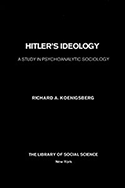| Statement Number |
Statement |
Source |
| Book |
Page |
| 1 |
The preservation of the existence of a species presupposes a spirit of sacrifice in the individual. |
MK |
151 |
| 2 |
The sacrifice of personal existence is necessary to secure
the preservation of the species. |
MK |
151 |
| 3 |
The state-forming or even state-preserving forces
are the ability and will of the individual to sacrifice
himself for the totality. |
MK |
151 |
| 4 |
A man does not die for business, but only for ideals. |
MK |
152 |
| 5 |
Only the struggle for the preservation of the species and
the hearth, or the state that protects it, has at all times driven men against the spears of their enemies. |
MK |
153 |
| 6 |
The young regiments had not gone to their death in
Flanders crying "Long live universal suffrage and the
secret ballot," but crying "Deutschland uber Alles in
der Welt." |
MK |
199 |
| 7 |
The most precious blood (in World War I) sacrificed itself joyfully, in the faith that it was preserving the independence and freedom of the fatherland. |
MK |
201 |
| 8 |
In the sacred ground the best comrades
slumbered, still almost children, who had run to their
death with gleaming eyes for the one true fatherland. |
MK |
201 |
| 9 |
When in the long war years Death snatched so many
a dear comrade and friend from our ranks, it would
have seemed to me almost a sin to complain-after all,
were,they not dying for Germany? |
MK |
204 |
| 10 |
The Aryan willingly subordinates his own ego to
the life of the community and, if the hour demands, even
sacrifices it. |
MK |
297 |
| 11 |
This state of mind, which subordinates the interest of
the ego to the conservation of the community, is really
the first premise for every truly human culture. |
MK |
298 |
| 12 |
In giving one's life for the existence of the community
lies the crown of all sacrifice. |
MK |
298 |
| 13 |
By idealism we understand only the individual's capacity to make sacrifices for the community, for his
fellow man. |
MK |
298 |
| 14 |
True idealism is nothing but the subordination of the
interests and life of the individual to the community. |
MK |
299 |
| 15 |
Any man who loves his people proves it solely by the
sacrifices which he is prepared to make for it. |
MK |
426 |
| 16 |
What made men die was not concern for their daily
bread, but love of the fatherland, faith in its greatness,
a general feeling for the honor of the nation. |
MK |
437 |
| 17 |
The idea of military service now dawned on (my lads in
terms of) the living consciousness of the duty to fight
for the existence of our people by sacrificing the life of
the individual, always and forever, at all times and places. |
MK |
491 |
| 18 |
More than once, thousands and thousands of young
Germans have stepped forward with self-sacrificing resolve
to sacrifice their young lives freely and joyfully
on the altar of the beloved father land. |
MK |
631 |
| 19 |
To be "social" means that every individual acts in
the interest of the community of the people, (and to be)
to such an extent convinced of the goodness of this
community as to be ready to die for it. |
S-I |
15 |
| 20 |
To be "national" means to act with a boundless
and all-embracing love for the people and, if necessary,
even to die for it. |
S-I |
15 |
| 21 |
Only he has a right to live who is prepared to work for
the community. |
S-I |
62 |
| 22 |
The National Socialist Party looked to those idealists who are ready if necessary to sacrifice their own
existence to the eternal life of people and of Reich. |
S-I |
142 |
| 23 |
You are nothing, your nation is everything. |
S-I |
402 |
| 24 |
Life for you German boys and girls must mean
sacrifice. |
S-I |
547 |
| 25 |
We all are but servants in this great task of the German nation. |
S-I |
664 |
| 26 |
We would subordinate our own ego to the demands of
Germany. |
S-I |
664 |
| 27 |
Nobody can do more than sacrifice himself for his people,
and to that sacrifice we must ever pledge ourselves. |
S-I |
664 |
| 28 |
Let us pledge ourselves at every hour, on every day,
only to think of Germany, of people and Reich, of our
great nation. |
S-I |
664 |
